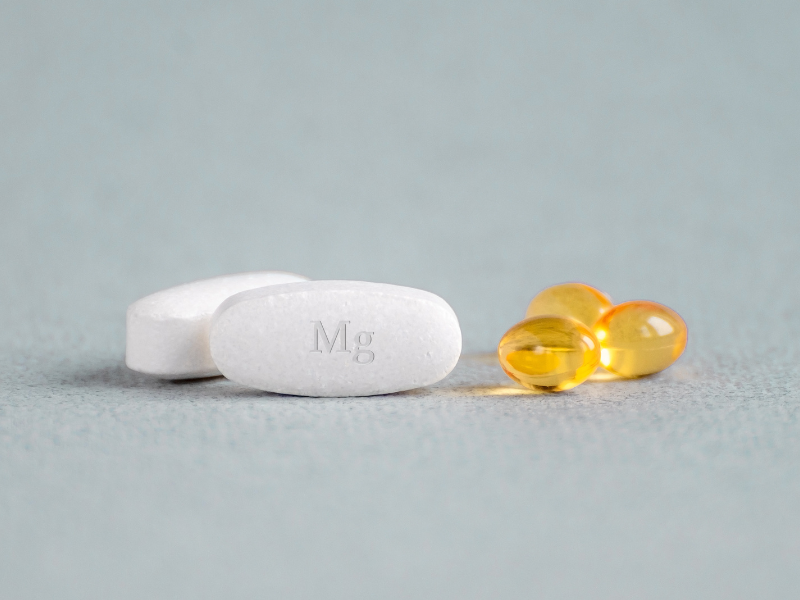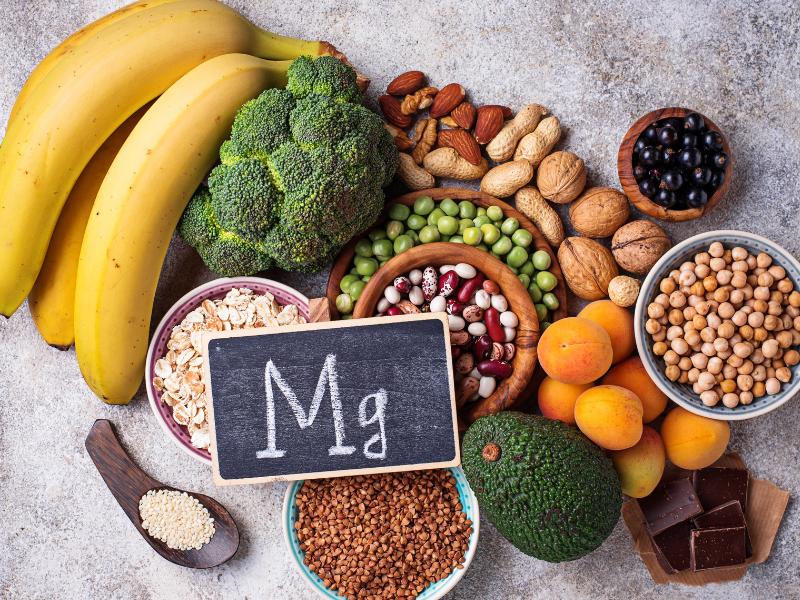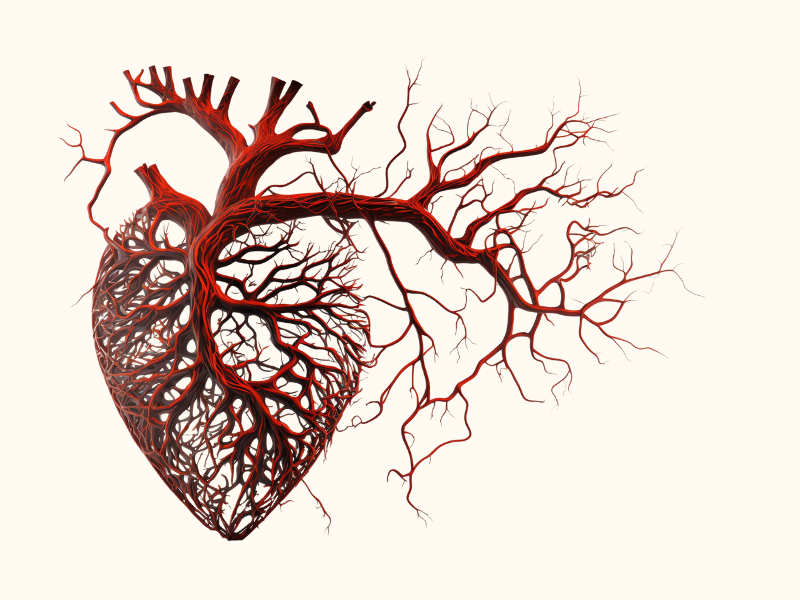28/02/2024
Vitamin D and magnesium in synergy
Magnesium and vitamin D are inextricably linked. The levels of one impact the levels and function of the other. The body needs magnesium to activate and transport vitamin D.
Taking certain nutrients together is beneficial for everyday health. Magnesium with vitamin D is a prime example of this.
These two everyday essentials, working together, magnesium and vitamin D can benefit musculoskeletal, metabolic, and heart health. In return, vitamin D can enhance magnesium absorption and retention.
The vitality of vitamin D and magnesium together
Researchers have recorded the essential relationship between magnesium and vitamin D (1).
Taking one without the other fails their full benefits:
- The vitamin D produced from sun exposure and consumed in food or through direct oral intake is inactive.
- Enzymes that activate vitamin D require the mineral magnesium to work properly. Magnesium supports transport of vitamin D throughout the body.
- Vitamin D may boost how magnesium is absorbed in the intestines.
- In a union, magnesium and vitamin D support musculoskeletal and heart health while promoting proper metabolic function.
What are the different types of magnesium?
It's known that magnesium is one of our basic needs in terms of minerals.
However, did you know that the different types of serve completely different functions in the body?
Each form of magnesium serves different purposes and may be chosen based on individual health needs and goals. Here is the run-down on the dynamic of each.
Magnesium citrate
If you're looking for a product that covers and supports a broad range of organs vulnerable to the aging process, this is it!
Magnesium citrate can:
- Promote heart and vascular health
- Contribute to strengthening your bones
- Help maintain normal muscle and nerve function (2,3)
Magnesium L-threonate (Neuromag)
Not all magnesium is easily absorbed into the brain and the central nervous system. Life Extension's Neuro-Mag® Magnesium L-Threonate offers an ultra-absorbable form of magnesium that is easier for the brain to absorb because it easily crosses the blood-brain barrier.
This can positively impact overall brain health and communication between neurons and is therefore brilliant for supporting memory and maintaining cognitive function (4-9).
Magnesium oxide
Magnesium oxide is a type of magnesium mineral supplement used to treat or prevent low levels of magnesium in the blood. It is one of the most common forms of magnesium supplements due to its high magnesium content by weight (10).
Moreover, it contains a high percentage of elemental magnesium but has poor solubility. This allows it to release magnesium over time, and this form is popular in extended-release magnesium products.
Magnesium succinate
This supplement is magnesium combined with succinic acid, a natural compound found in the body and some foods. The combination can offer a bioavailable form of magnesium, being efficiently absorbed and utilized by the body.
Magnesium succinate is often chosen for its potential benefits in energy production and cellular metabolism because succinic acid is involved in the Krebs cycle (a key part of cellular energy production).
This form of magnesium may be particularly beneficial for individuals looking to support energy levels, reduce fatigue, and improve metabolic health.
Life Extension's Magnesium Caps for whole-body health contain both magnesium succinate, oxide, and citrate.
Magnesium acetyl taurinate
Life Extension’s Calm-Mag contains magnesium acetyl taurinate, which is another form that can readily cross the blood-brain barrier and positively impact the brain pathways associated with stress management (11).
Magnesium acetyl-taurate has been shown to help the mind relax, encourage feelings of calmness, and promote the healthy activity of feel-good neurotransmitters like serotonin and GABA.
The magnesium-potassium combination
Magnesium and potassium is a powerful combination as they work together in a lot of ways, and they are even referred to as sisters!
Potassium is involved in many of the same biological reactions as magnesium. It supports vasodilation which is the expanding of your blood vessels.
This, in turn, encourages healthy blood flow. This mineral also encourages the body to expel sodium through urine, which supports cardiovascular health.
What does vitamin D do?
As far as research goes, the health benefits of vitamin D are well-established. However, the effectiveness of vitamin D intake depends on getting enough magnesium.
Vitamin D is essential for:
- Immune function
- Heart health
- Cognitive performance (12,13)
The sad reality is that many people aren’t getting the full benefits of vitamin D due to a low level of magnesium. It’s estimated that 10 to 20 per cent of the world’s population is magnesium deficient (14).
- Magnesium is essential for converting vitamin D into its active form (15,16).
- Magnesium aids vitamin D transport in the blood (17,18).
- Maintaining sufficient vitamin D levels helps magnesium achieve its many benefits (19,20).
- Studies focusing on vitamin D and magnesium are confirming their combined benefits for immunity, muscle strength, heart health, and more (21-23).
Blood benefits
Magnesium plays a crucial role in transporting vitamin D in the blood and activating cell receptors for its use (15,31).
Magnesium deficiency can reduce vitamin D receptor numbers, diminishing its effectiveness (27). Additionally, magnesium promotes the production of parathyroid hormone, essential for converting vitamin D into its active form (21, 26-32) .
Additionally, magnesium promotes the production of parathyroid hormone, essential for converting vitamin D (30, 31, 32, 33) into its active form (28).
Longevity benefits
Research links vitamin D deficiency to increased mortality risk, with low magnesium levels intensifying this risk. A study of 1,892 men over 22 years found those with low vitamin D and magnesium intake had a 60% higher death risk (26).
Additionally, magnesium has proven essential in treating rickets by enabling vitamin D activation, where vitamin D alone was insufficient (29).
A study with postmenopausal women also revealed that magnesium supplementation reduced vitamin D deficiency by about 20%. This stresses the critical interplay between the nutrients for health and longevity (27).
Bone and teeth benefits
Vitamin D and magnesium are crucial for maintaining healthy bone mass and strength (36,37).
- Together, they enhance bone health; vitamin D aids in the absorption of calcium and magnesium, preventing osteoporosis.
- Low magnesium levels can lead to reduced parathyroid hormone levels and lower active vitamin D levels, affecting bone health (20).
- Both nutrients are essential for mineral replenishment in teeth, potentially preventing tooth loss (37,38).
- Adequate vitamin D levels are linked to the success of dental implant surgeries (39).
- Oral health significantly affects overall health, with links between periodontal disease and systemic diseases like type II diabetes and cardiovascular disease (38).
- Vitamin D and magnesium can further fight oral inflammation and prevent periodontal disease (37,39).
All to do with muscle
Sarcopenia, the age-related loss of muscle mass and function leading to falls and fractures, is partly caused by chronic inflammation (35).
Vitamin D and magnesium can reduce this inflammation and potentially prevent sarcopenia (23). Research shows vitamin D receptors in muscle decrease with age, but oral vitamin D can increase these receptors (34).
A study with vitamin D-deficient middle-aged women showed that those taking vitamin D and magnesium improved in handgrip strength and mobility significantly more than the placebo group, along with reduced inflammation (23).
Read more
- Crucial nutrients for strong bones and health
- Brain-restoring impact of magnesium L-threonate
- See all blog posts
- All about multivitamins
- Everyday essentials
References
- Dai Q, Zhu X, Manson JE, et al. Magnesium status and supplementation influence vitamin D status and metabolism: results from a randomized trial. Am J Clin Nutr. 2018 Dec 1;108(6):1249-58.
- Magnes Res. 2010 Jun;23(2):60-72.
- Eur J Clin Invest. 2011 Apr;41(4):405-10.
- Neuron. 2010;65(2):165-77.
- Nutr Rev. 2012;70(3):153-64.
- Magnes Res. 2009;22(4):235-46.
- J Alzheimers Dis. 2016;49(4):971-90.
- Expert Opin Ther Targets. 2014;18(10):1121-30.
- Mol Brain. 2014;7:65.
- Life Extension Magazine, Dec 2014. Magnesium: The Missing Link To A Healthy Heart
- Biol Trace Elem Res. 2019;192(2):244-251.
- Cannell JJ, Hollis BW. Use of vitamin D in clinical practice. Altern Med Rev. 2008 Mar;13(1):6-20.
- Hansdottir S, Monick MM, Hinde SL, et al. Respiratory epithelial cells convert inactive vitamin D to its active form: potential effects on host defense. J Immunol. 2008 Nov 15;181(10):7090-9
- https://www.cerascreen.co.uk/blogs/health-portal/magnesium-deficiency-symptoms?refURL=https%3A%2F%2Fwww.google.com%2F
- Deng X, Song Y, Manson JE, et al. Magnesium, vitamin D status and mortality: results from US National Health and Nutrition Examination Survey (NHANES) 2001 to 2006 and NHANES III. BMC Med. 2013 Aug 27;11:187.
- Available at: https://lpi.oregonstate.edu/mic/vitamins/vitamin-D. Accessed April 27, 2021.
- Rosanoff A, Dai Q, Shapses SA. Essential Nutrient Interactions: Does Low or Suboptimal Magnesium Status Interact with Vitamin D and/or Calcium Status? Adv Nutr. 2016 Jan;7(1):25-43.
- Erem S, Atfi A, Razzaque MS. Anabolic effects of vitamin D and magnesium in aging bone. J Steroid Biochem Mol Biol. 2019 Oct;193:105400.
- Uwitonze AM, Razzaque MS. Role of Magnesium in Vitamin D Activation and Function. J Am Osteopath Assoc. 2018 Mar 1;118(3):181-9.
- Al Alawi AM, Majoni SW, Falhammar H. Magnesium and Human Health: Perspectives and Research Directions. Int J Endocrinol. 2018;2018:9041694.
- Farhanghi MA, Mahboob S, Ostadrahimi A. Obesity induced magnesium deficiency can be treated by vitamin D supplementation. J Pak Med Assoc. 2009 Apr;59(4):258-61.
- Abiri B, Vafa M. Effects of vitamin D and/or magnesium supplementation on mood, serum levels of BDNF, inflammatory biomarkers, and SIRT1 in obese women: a study protocol for a double-blind, randomized, placebo-controlled trial. Trials. 2020 Feb 26;21(1):225.
- Kheyruri F, Sarrafzadeh J, Hosseini AF, et al. Randomized Study of the Effects of Vitamin D and Magnesium Co-Supplementation on Muscle Strength and Function, Body Composition, and Inflammation in Vitamin D-Deficient Middle-Aged Women. Biol Trace Elem Res. 2020 Sep 21.
- Danik JS, Manson JE. Vitamin d and cardiovascular disease. Curr Treat Options Cardiovasc Med. 2012 Aug;14(4):414-24.
- Vazquez-Lorente H, Herrera-Quintana L, Molina-Lopez J, et al. Response of Vitamin D after Magnesium Intervention in a Postmenopausal Population from the Province of Granada, Spain. Nutrients.2020Jul 30;12(8).
- Mursu J, Nurmi T, Voutilainen S, et al. The association between serum 25-hydroxyvitamin D3 concentration and risk of disease death in men: modification by magnesium intake. Eur J Epidemiol. 2015 Apr;30(4):343-7.
- Reddy P, Edwards LR. Magnesium Supplementation in Vitamin D Deficiency. Am J Ther. 2019 Jan/Feb;26(1):e124-e32
- Khundmiri SJ, Murray RD, Lederer E. PTH and Vitamin D. Compr Physiol. 2016 Mar 15;6(2):561-601.
- Gallagher JC. Vitamin D and aging. Endocrinol Metab Clin North Am. 2013 Jun;42(2):319-32.
- Dai Q, Zhu X, Manson JE, et al. Magnesium status and supplementation influence vitamin D status and metabolism: results from a randomized trial. Am J Clin Nutr. 2018 Dec 1;108(6):1249-58.
- Rosanoff A, Dai Q, Shapses SA. Essential Nutrient Interactions: Does Low or Suboptimal Magnesium Status Interact with Vitamin D and/or Calcium Status? Adv Nutr. 2016 Jan;7(1):25-43.
- Uwitonze AM, Razzaque MS. Role of Magnesium in Vitamin D Activation and Function. J Am Osteopath Assoc. 2018 Mar 1;118(3):181-9.
- Al Alawi AM, Majoni SW, Falhammar H. Magnesium and Human Health: Perspectives and Research Directions. Int J Endocrinol. 2018;2018:9041694.
- Cruz-Jentoft AJ, Bahat G, Bauer J, et al. Sarcopenia: revised European consensus on definition and diagnosis. Age Ageing. 2019 Jan 1;48(1):16-31.
- Cruz-Jentoft AJ, Dawson Hughes B, Scott D, et al. Nutritional strategies for maintaining muscle mass and strength from middle age to later life: A narrative review. Maturitas. 2020 Feb;132:57-64.
- Razzaque MS. Magnesium: Are We Consuming Enough? Nutrients. 2018 Dec 2;10(12):1863.
- Uwitonze AM, Rahman S, Ojeh N, et al. Oral manifestations of magnesium and vitamin D inadequacy. J Steroid Biochem Mol Biol. 2020 Jun;200:105636.
- Uwitonze AM, Murererehe J, Ineza MC, et al. Effects of vitamin D status on oral health. J Steroid Biochem Mol Biol. 2018 Jan;175:190-4.
- Nastri L, Moretti A, Migliaccio S, et al. Do Dietary Supplements and Nutraceuticals Have Effects on Dental Implant Osseointegration? A Scoping Review. Nutrients. 2020 Jan 20;12(1).








